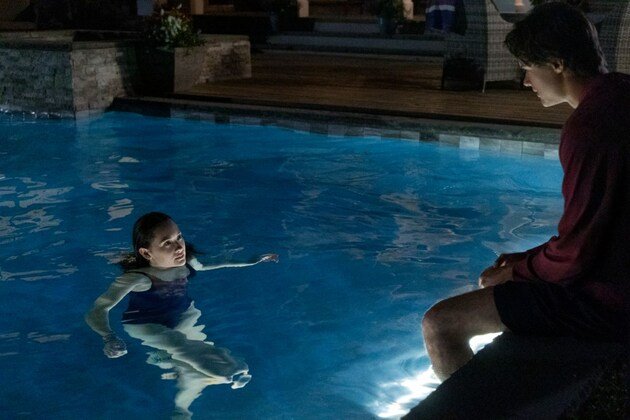The Summer I Turned Pretty Story:-
Amazon’s The Summer I Turned Pretty stands out as a poignant coming-of-age tale that delicately navigates the intricacies of late adolescence. With tender writing and heartfelt performances, the series captures the nuanced shifts in self-perception that accompany this transformative stage of life. However, it also acknowledges the occasional cluelessness and self-absorption typical of teenagers as they grapple with newfound identity and relationships.
Movie Ratings
| Release Date | 17 June 2022 |
| Language | English |
| Genre | Drama |
| Episodes | 7 |
| Creator | Jenny Han, Gabrielle Stanton |
| Cast | Lola Tung, Rachel Blanchard, Jackie Chung, Christopher Briney, Gavin Casalegno, Sean Kaufman, Minnie Mills, Alfredo Narciso |
| Director | Erica Dunton |
| Writer | Jenny Han, Marty Scott, Deborah Swisher |
| Cinematography | J.B. Smith |
| Producer | Jenny Han, Gabrielle Stanton, Karen Rosenfelt, Paul Lee, Nne Ebong, Hope Hartman |
| Production | Amazon Studios, Wiip Studios |
| Certificate | 16+ |
While the exploration of adolescence is compelling, the series falls short in delivering a convincing love story. The connections between characters feel more explained than genuinely felt, detracting from the overall impact of the narrative.
Adapted by Jenny Han, author of To All the Boys I’ve Loved Before, the story centers on Isabel, affectionately known as Belly (portrayed by Lola Tung). Belly anticipates spending her 16th summer at Cousins Beach with her family and close friends, just as she has for the past fifteen years. The beach house holds a special significance for Belly, serving as a sanctuary where time seems to stand still.
However, this summer brings unexpected changes, hinted at in the title itself. Tung’s portrayal of Belly’s blossoming beauty is captivating, conveying her inner turmoil and uncertainty alongside newfound confidence. As Belly grapples with her evolving identity, she finds herself drawn to new experiences, from deb balls to clandestine beach gatherings, as she seeks to discover her true self.
While her loved ones express concern that these changes aren’t true to her nature, Belly sees them as essential steps in her journey of self-discovery. The series adeptly captures Belly’s internal conflict and the complexity of her personal growth.
Beyond Belly’s story, the series also delves into the struggles of characters like Susannah and Laurel, who confront their own challenges independent of their children’s dramas. This multifaceted approach adds depth to the narrative, highlighting the universal themes of self-discovery and personal agency.
As Belly learns to navigate her own narrative, she also comes to realize that everyone around her is grappling with their own inner struggles and desires. This realization serves as a poignant reminder of the complexity of human experiences and the importance of empathy in understanding others’ perspectives.
Overall, while The Summer I Turned Pretty excels in capturing the essence of adolescence and self-discovery, its portrayal of romantic relationships falls short of the emotional depth achieved in other aspects of the narrative. Despite this limitation, the series remains a heartfelt exploration of identity, growth, and the complexities of human connection.
Until the season’s conclusion, the seven hour-long episodes of The Summer I Turned Pretty offer Belly ample room to navigate her shifting relationships and evolving sense of self, accompanied by a soundtrack filled with popular singles that often mirror the onscreen action quite literally. For instance, Frank Ocean’s “Super Rich Kids” sets the tone at a party filled with affluent youngsters. While this could come across as excessive, there’s an undeniable relatability in listening to Olivia Rodrigo or Ariana Grande on repeat, finding solace in lyrics that resonate with one’s inner turmoil.
Regrettably, even the most iconic songs from Taylor Swift’s repertoire cannot compensate for the lack of chemistry in the show’s romantic relationships. The Summer I Turned Pretty relies heavily on the premise of every boy falling for Belly, which admittedly fulfills a fantasy. The casting of young actors who exude high school crush material adds to the allure, with characters like Jeremiah embodying exuberant boyishness and Cam portraying endearing nerdiness. However, the plot confines the teenage characters, aside from Belly, to a peculiar standstill, preventing them from pursuing their own romantic futures until Belly resolves her tangled love life.
Furthermore, the series struggles to generate genuine chemistry between its romantic pairings. While it successfully emphasizes the importance of friendship, it falls short in conveying the passion of romance. Relationships like Susannah and Laurel, Belly and Taylor, and Jeremiah and Steven feel ripe for blossoming into genuine romance due to their shared history and deep connection. Conversely, Belly’s supposed infatuation with Conrad lacks believability, as their interactions onscreen feel awkward and devoid of genuine connection.
Nevertheless, the finale weaves together the series’ various narrative threads with enough emotional resonance to warrant a second season. However, it’s notable that the most poignant moments stem from familial bonds and friendships rather than romantic entanglements.
Moving forward, one hopes that The Summer I Turned Pretty takes inspiration from Belly’s journey and explores its own narrative identity, rather than adhering strictly to the romantic conventions dictated by its source material.






